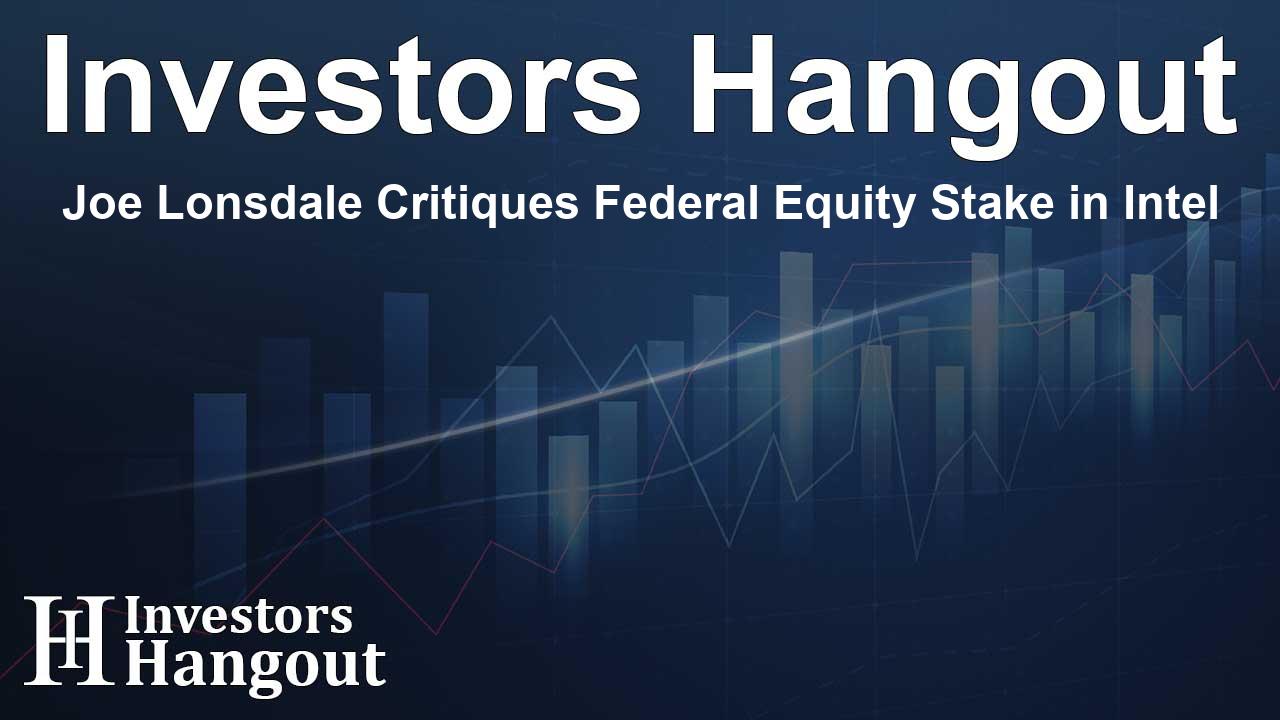Joe Lonsdale Critiques Federal Equity Stake in Intel

Government Involvement in Intel's Stake Raises Eyebrows
Joe Lonsdale, co-founder of Palantir Technologies Inc. (NASDAQ: PLTR), has recently voiced his discomfort regarding the federal government's decision to acquire an equity stake in Intel Corp. (NASDAQ: INTC). Lonsdale's comments were made during an appearance on CNBC, where he characterized the investment as unusual and indicative of favoritism. He expressed concern about the implications of such government involvement in private enterprises.
Concerns Over Cronyism and Government Spending
Lonsdale noted that the government's financial intervention is puzzling, particularly the allocation of $9 billion to a company like Intel. He remarked, "It's very weird for the government to be taking a stake in something." The Palantir co-founder further emphasized that this approach could be seen as a form of cronyism, which undermines the competitiveness of the market.
Funding Breakdown for Intel's Stake
Intel has indicated that the funds for this equity stake will be sourced from a combination of previously awarded government grants. Specifically, they plan to use $5.7 billion earmarked under the U.S. CHIPS and Science Act, complemented by an additional $3.2 billion from the Secure Enclave program. This strategy comes coupled with a push to invest in new manufacturing facilities across the country.
Potential for Broader Industrial Investment
Furthermore, reports suggest that the White House may not stop with Intel. Feedback from National Economic Council Director Kevin Hassett hinted that similar transactions may extend to other industries. He stated, "There'll be more transactions, if not in this industry, in other industries," implying a potential broadening of government financial commitments in the private sector.
Public Investment in National Security
During his interview, Lonsdale clarified that he could support government investment if it demonstrably advances national security interests. However, he raised questions about the precedent set by direct government ownership of private companies in non-emergency situations, arguing that such actions could distort free market principles.
Legislative and Economic Critique
Criticism has been voiced from various quarters, particularly on Capitol Hill, regarding the government holding significant stakes in corporations like Intel. With plans for the U.S. to ultimately hold around 10% of Intel, political figures like Senator Rand Paul have labeled this initiative a “big mistake,” warning that it detracts from the competitive forces necessary for excellence in business. Economists, including Peter Schiff, have contended that this is not only unconstitutional but also a misguided strategy that could have lasting negative implications.
Mixed Reactions to Government Stake
Interestingly, not all responses have been negative. Some, like Senator Bernie Sanders, have expressed approval of the plan. Sanders noted, "I am pleased the Trump administration agrees with the amendment I proposed three years ago," indicating a shift towards ensuring taxpayer dollars yield returns in the form of equity stakes rather than outright corporate welfare.
Market Reaction to the Intel Stake
As these discussions unfold, market reactions have also been notable. Shares of Intel recently experienced a dip, closing at $24.49, with a slight additional decline observed in after-hours trading. Despite this, the stock is rated positively in various performance metrics, indicating that investor sentiment might be more complex than simple opposition to government stakes.
Frequently Asked Questions
1. What did Joe Lonsdale say about the Intel stake?
Joe Lonsdale expressed concerns over the government's involvement in acquiring a stake in Intel, labeling it as favoritism and a form of cronyism.
2. How is the equity stake in Intel financed?
The stake will be funded using previously awarded grants from the U.S. CHIPS and Science Act and the Secure Enclave program.
3. What are the broader implications of this government investment?
The White House has indicated that similar investments may extend beyond Intel to various other industries, potentially reshaping public-private financial dynamics.
4. How have politicians reacted to the Intel investment?
Responses have varied, with some criticizing the initiative as detrimental to market excellence, while others, like Bernie Sanders, have supported the approach as beneficial for taxpayers.
5. What was the market reaction to Intel’s performance?
Intel's shares saw a slight decline in value, yet there remains overall investor optimism reflected in solid ranking metrics despite the controversy.
About The Author
Contact Hannah Lewis privately here. Or send an email with ATTN: Hannah Lewis as the subject to contact@investorshangout.com.
About Investors Hangout
Investors Hangout is a leading online stock forum for financial discussion and learning, offering a wide range of free tools and resources. It draws in traders of all levels, who exchange market knowledge, investigate trading tactics, and keep an eye on industry developments in real time. Featuring financial articles, stock message boards, quotes, charts, company profiles, and live news updates. Through cooperative learning and a wealth of informational resources, it helps users from novices creating their first portfolios to experts honing their techniques. Join Investors Hangout today: https://investorshangout.com/
The content of this article is based on factual, publicly available information and does not represent legal, financial, or investment advice. Investors Hangout does not offer financial advice, and the author is not a licensed financial advisor. Consult a qualified advisor before making any financial or investment decisions based on this article. This article should not be considered advice to purchase, sell, or hold any securities or other investments. If any of the material provided here is inaccurate, please contact us for corrections.
